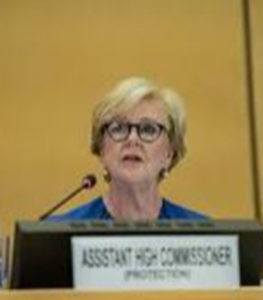UN’s Triggs hits out at nations denying asylum under the guise of COVID
United Nations refugee protection chief and former Australian Human Rights Commission Gillian Triggs has hit out at nations denying asylum and refuge to displaced persons under bogus concerns about ‘public health’.
Assistant High Commissioner for Protection, Professor Triggs, warned that “measures restricting access to asylum must not be allowed to become entrenched under the guise of public health”.
 She was speaking at a virtual session of the United Nations High Commissioner for Refugees (UNHCR) annual Dialogue on Protection.
She was speaking at a virtual session of the United Nations High Commissioner for Refugees (UNHCR) annual Dialogue on Protection.
Prof Triggs urged nations to maintain access for asylum seekers and to safeguard the rights of refugees, together with displaced and Stateless people.
She said COVID-19 had had a deep and hard-hitting impact on refugees, including restrictions impeding access to asylum, spiraling gender-based violence, risks of unsafe returns, and the loss of livelihoods.
Participants at the Dialogue, including displaced people, non-government organizations and Government speakers from Asia, Africa, the Middle East and Europe, heard how compassion and initiative could help ensure that asylum claims were considered during the pandemic as well as how protection services had adapted to reach people in need during lockdowns.
The dialogue also heard to how the pandemic presented greater challenges for the protection of refugees, internally displaced and stateless people and maintaining the need for solidarity and greater support.
“The pandemic has threatened the social and economic rights of the most vulnerable in society – among them refugees and those forcibly displaced who, all too often, depend on the informal economy”, Prof Triggs said.
“They are among the first to suffer the economic impacts of a lockdown,” she said.
The gathering heard how UNHCR operations staff had reported increasing incidents of discrimination, stigmatisation and xenophobia against refugees and displaced people, exacerbating tensions with local communities.
“The virus does not distinguish between legal status or nationality”, Prof Triggs said.
“Access to health services should not depend on citizenship or restrictive visa conditions,” she said.
Prof Triggs said “a realistic and practical opportunity for protection” existed in social inclusion and in non-discriminatory access to education, health and employment.
The High Commissioner’s Dialogue was established more than a decade ago for refugees, Governments, the private sector and international organizations to exchange views on global protection matters.
This year, discussions are being held through five virtual sessions spread over the last quarter of the year, with the closing session to take place on December 9.
See Prof Triggs speak here: https://www.unhcr.org/news/videos/2020/10/5f7e1b8c4/unhcrs-gillian-triggs-warns-covid-19-severely-testing-refugee-protection.html












